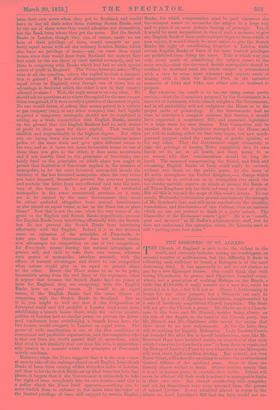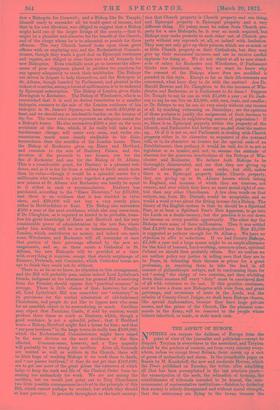THE BISHOPRIC OF ST. ALBANS.
T1:114 Church of England i said to be the richest in the- world, and certainly includes among its worshippers an unusual number of millionaires, but the difficulty it finds in collecting cash sufficient to found a Bishopric is of the most distressing kind. It has apparently to sell its old clothes to pay for a new Episcopal throne. One would think that with strong Churchmen in power, and Churches founded every- where, and a generation of working Bishops on the Bench, a trifle like £120,000, if really wanted for a new See, could be provided in a day,—but it is not so. Money is forthcoming in heaps for any other purpose, but a Bishopric can only be founded by a sort of Episcopal subscription, supplemented by a sale of needlessly magnificent Church furniture. The State will not give the Church a penny. Mr. Gladstone is a Church- man to the bone, and Mr. Disraeli, besides being always on the side of the Angels, is the head of the Church party, but Mr. Disraeli and Mr. Gladstone alike accept the axiom that there must be no new endowments. As for the laity, they will do nothing for English Bishoprics. Lady Burdett-Coutts has founded See after See in far-off heathendom, men like Mr. Beresford Hope have lavished wealth on churches of that style which costs twelve hundred a year" to keep them in repair,and the Bishop of London's Fund for new Churches in the Metropolis will soon reach half-a-million sterling. But nobody, not even Baron Grant, will subscribe anything to relieve the overburdened General Officers of the spiritual army. Some of them are literally almost worked to death. Others confess openly that it is not in human power to overtake their duties. Others will never be efficient till their work is reduced to manageable limits in their own eyes. But though overflowing with sympathy and oil, lay Samaritans turn away unvexed from the groans of mitred Levites. It was admitted almost in words in the debate on Lord Lyttelton's Bill that the laity would not en- dow a Bishopric for Cornwall ; and a Bishop like Dr. Temple, himself ready to surrender all he could spare of income, and that in his own life-time, was obliged to suggest that a Bishop might hold one of the larger livings of the county,—that is, might be a pluralist and absentee for the benefit of the Church, and of the clergy whom he is to admonish or punish for those offences. The very Church herself looks upon these great officers with an unpitying eye, and the Ecclesiastical Commis- sioners, though they waste a good deal on Episcopal residences and repairs, are obliged to close their ears to all demands for new Bishoprics. Even windfalls must go to increase the allow- ances of poor clergymen placed in parishes too populous for any agency adequately to reach their multitudes. The Bishops are driven in despair to help themselves, and the Bishopric of St. Albans, though founded by Parliament, and planted in the richest of counties, among a forest of millionaires, is to be endowed by Episcopal subscription. The Bishop of Loudon gives Stoke Newington to Rochester. The Bishop of Winchester, who is so overworked that it is said he desires translation to a smaller bishopric, consents to the sale of the London residence of his bishopric in St. James's Square,—a house worth £60,000 at least, and we should say an intolerable burden on the income of the See. The mere rates must represent an adequate rental for a Bishop's house. •He also surrenders£500 a year on the next avoidance of •the See, which, if he really will take a less burdensome charge,- -will occur very soon and under cir- cumstances much more clearly creditable to his disin- terestedness than the sacrifice of his London house. Then the Bishop of Rochester gives up Essex and Hertfoni, and consents to the sale of Danbury Palace, and the devotion of the proceeds to two houses, one for the See of Rochester and one for the Bishop of St. Albans. This is a considerable grant, for Danbury is a pleasant resi- dence, and as it is too far from a railway to fetch much more than its value—though it would be a splendid centre for a millionaire who wanted to piece together a great estate—the new palaces at St. Albans and Rochester can hardly be equal to it either in rank or accommodation. Danbury was purchased, according to the "Essex Directory," for £23,000, and there is no evidence that it has doubled in value since, and £20,000 will not buy a very stately place either in Hertfordshire or Kent. The Bishop also surrenders £500 a year at the next avoidance, which also may come soon, if Dr. Claughton, as is reported or hinted to be probable, trans- fers his great knowledge of Essex and Hertford and his very considerable power of administration to the new See, where under him nothing will be new or inharmonious. Finally, London which contributes no money, and indeed can spare none,
London, and Rochester will all surrender at once
that portion of their patronage affected by the new ar- rangements and so, as there exists a Cathedral in St. Albans, the new Bishopric will be provided at a blow with everything it requires, except that stately surplusage of Deanery, Prebends, and Canonries, which Cathedral towns are apt to think they could not do without.
There is so far as we know, no objection to this arrangement, and the Bill will probably pass, unless indeed Lord Lyttelton's friends, indignant at the treatment his general Bill is receiving from the Premier, should oppose this "practical measure" in revenge. There is little chance of that, however, for after all, Lord Lyttelton's Bill was somewhat too "voluntary" in its provisions for the cordial admiration of old-fashioned Churchmen, and people do not like to oppose men who seem for an unselfish object to be surrendering so much. Cavillers may object that Farnham Castle, if sold by auction, would produce three times as much as Danbury, which, though a good residence, is not a splendid palace ; that if Hertford wants a Bishop, Hertford might find a house for him ; and that "our poor brethren" in the large towns do really lose £100,000, which the Ecclesiastical Commissioners might have raised by the same devices -on the next avoidance of the Sees affected. Common-sense, however and a Tory majority will probably be too strong for cavillers. After all, Generals are wanted as well as soldiers in the Church, there will be little hope of working Bishops if we work them to death, and "our poorer brethren," if they do not get that £100,000, are to get one more of the great prizes the existence of which helps to keep the rank and file of the Clerical Order from be- coming too melancholy for work. We are not among the cavilers, but we would just point out to Tory Churchmen two little possible consequences involved in the principle of this Bill, which cannot perhaps be avoided, but which they should at least perceive. It proceeds throughout on the tacit assump-
tion that Church property is Church property and one thing, and Episcopal property is Episcopal property and a very different thing. No penny must be taken from Church pro- perty for a new Bishopric, be it ever so much required, but Bishops may make presents to each other out of Church pro- perty without any reproach at all, or indeed with laudation.
They may not only give up their palaces, which are as much or as little Church property as their Cathedrals, but they may give up their successors' incomes, and are to receive cordial applause for doing so. We do not object at all to new stand- ards of salary for Rochester and Winchester, if Parliament
thinks new standards wise, but we want to know why the consent of the Bishops whose Sees are modified is paraded in this style. Except so far as their life-interests are concerned, what have they to do with the matter? Are Dr. Harold Browne and Dr. (Naughton to fix the incomes.of Win- chester and Rochester, or is Parliament to fix them ? Suppose Dr. Temple to say he can do with £1,000 a year ; or Dr. Jack- son to say he can live on £2,000, with rent, coals, and candles ; or Dr. Selwyn to say he can do very nicely without any income at all by teaching swimming on Saturdays ; are the opinions of those prelates to justify the assignment of their incomes to newly erected Sees in neighbouring centres of population ? If so, there is an Episcopal property within the property of the Church, and Parliament had _better say .so, and clear tire naatter up, Or if, it is not so, and Parli4re(ellt.ia dealing with Church property either in its character aa rimponent of the national will, or in its character as trustee kg.-- the special ends of an Establishment, then perhaps it woulithe well for it to act as legislator or as trustee, and not to assume the attitude of almoner for the generous benefactions of the Bishops of Win- chester and Rochester. We believe both Bishops to be thoroughly disinterested, and see that they are giving up secular advantages of no mean ordfiu., but still, unless there is an Episcopal property, inificlei,:Church property, they are giving up to St. Albans houses which belong to England, and incomes of which they are trustees, not owners, and over which they have no more moral right of con- trol than any other Churchmen. A few clear words on that subject, say, from Mr. Disraeli, would be acceptable, and so would a word or two about the fitting income for a Bishop. The theory of the English system is that he should be a Spiritual Peer, or at least a Spiritual Peer's Heir Apparent, to go into the Lords on a death-vacancy, but the practice is to cut down his income on every possible opportunity. The other day the Bishops were some of them millionaires. Then it was settled that £4,200 was the least a Bishop should have. Now £3,500 is suggested as perhaps enough for St. Alban s. We have no objection to offer to reductions. If we had County Bishops, £1,500 a year and a large manse might be an ample allowance for the kind of learned, hard-working, common-place, spiritual Colonel we should then probably obtain. But we confess we see neither policy nor justice in telling men that they are to be Peers, in defending their thrones as prizes for a great profession, in requiring them to take the lead in all manner of philanthropic outlays, and in condemning them for not " seeing " the clergy of two counties, and then whittling down their incomes till every "duty" must be considered first of all with reference to its cost. If this practice continues, and we have a dozen new Bishoprics with wide Sees, and great patronage, and reversions of seats in the Lords, and the salaries of County-Court Judges, we shall have Bishops chosen, like special Ambassadors, because they have large private means, and the prizes of the Church, like the pleasant com- mands in the Army, will be reserved to the people whose fathers inherited, or made, or stole much cash.



































 Previous page
Previous page